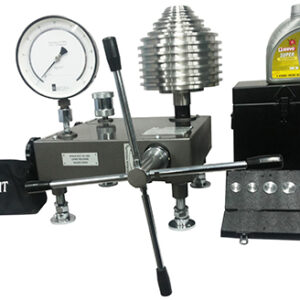Ravika
- Ravika's Products
- Key Specifications
- Why Choose Ravika?
- FAQs
Ravika’s Deadweight Pressure Gauges
Ravika’s Deadweight pressure gauges are precision instruments used to measure pressure based on the principle of balance. They operate by placing a known weight on a piston that is in contact with the fluid whose pressure is being measured. As the fluid exerts pressure on the piston, the weight is adjusted until it balances the pressure, allowing for an accurate measurement.
Key Specifications of Deadweight Pressure Gauges
| Specification | Description |
|---|---|
| Measurement Range | Wide range from low millibars to several thousand psi |
| Accuracy | Typically ±0.01% to ±0.1% of the reading |
| Calibration Weights | Comes with a set of calibrated weights for easy measurement |
| Piston and Cylinder Design | Robust assembly for smooth operation and minimized friction |
| Temperature Range | Operates from -10°C to 60°C (14°F to 140°F) |
| Materials | Durable construction, often stainless steel |
| Connection Type | Various options, including threaded or flange connections |
| Portability | Designed for easy transport for field use |
| Ease of Use | User-friendly interface for setup and measurement reading |
| Calibration Interval | Recommended intervals for maintaining accuracy |
Why Choose Ravika’s Deadweight Pressure Gauges?
Ravika’s deadweight pressure gauges are top-notch instruments designed for accurate pressure measurement in various industries. Here are some reasons to choose them:
Unmatched Accuracy: Ravika’s gauges offer exceptional accuracy, with readings within ±0.01%. This level of precision is essential for maintaining quality standards in sectors like oil and gas, pharmaceuticals, and manufacturing.
Strong Construction: Built to withstand tough industrial conditions, Ravika instruments are made from high-quality materials for long-lasting performance. Their durability means less need for frequent recalibrations and replacements.
User-Friendly Design: The intuitive design of these gauges makes them easy to use. With clear markings and simple setup procedures, operators can quickly get accurate results, reducing training time and increasing efficiency.
Versatile Applications: Whether you need to calibrate pressure gauges in a lab or check the pressure in production lines, Ravika’s gauges can handle various tasks. They are adaptable to different fluid types and pressure ranges, making them suitable for many industries.
What is a Deadweight Pressure Gauge?
A deadweight pressure gauge measures pressure by balancing a known weight against the pressure exerted by a fluid. This method provides highly accurate readings.
How Accurate Are Ravika Deadweight Pressure Gauges?
Deadweight pressure gauges typically offer accuracy within ±0.01% to ±0.1% of the reading, making them ideal for precise pressure measurements in various applications.
What Industries Commonly Use Ravika Deadweight Pressure Gauges?
These gauges are widely used in industries such as oil and gas, pharmaceuticals, manufacturing, and laboratories, where accurate pressure measurement is crucial.
How Do You Operate a Ravika Deadweight Pressure Gauge?
To operate a deadweight pressure gauge, you place calibrated weights on a piston in contact with the fluid. You then adjust the weights until they balance with the pressure, allowing you to read the measurement.
Are Ravika Deadweight Pressure Gauges Easy to Maintain?
Yes, deadweight pressure gauges are relatively easy to maintain. Regular calibration is recommended to ensure accuracy, but their robust design means they require fewer replacements.




